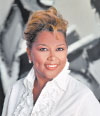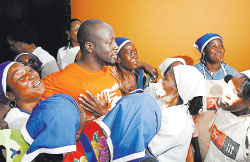Yéle Haiti – Foundation dedicated to improving life in Haiti
February 1, 2010 by Las Vegas Black Image Magazine
Filed under Cover Story, Feature
When major events occur, it is often said that “the earth stood still.” In the aftermath of the devastating 7.0-magnitude earthquake that rocked Haiti on Jan. 12, people around the world have become transfixed by nonstop coverage of the disaster and death left in its wake.
The capital city of Port-au-Prince — the political and economic center of one of the world’s poorest countries — was shaken with a fury that sent buildings of every size crumbling to the ground. The quake was followed immediately by the cries of millions whose dreams were once again deferred and whose loved ones’ lives met tragic ends.
In a matter of seconds, a population of 9 million people — 95 percent of whom are black — was faced with mass destruction and hundreds of thousands of lives lost. Already desperately poor, Haiti was virtually invisible from the outside to all but a few who have dedicated their lives to improving conditions for all Haitians. Among them: famed recording artist Wyclef Jean, a native of the island nation, who, despite his fame and fortune, never detached from his impoverished homeland. In 2005, he formed Yéle Haiti, a foundation dedicated to improving life on the island by providing new opportunities for its people.
According to Las Vegas resident Marilyn Crawford, who is the organization’s ambassador-at-large, “The original objective with the Yéle — which means ‘cry for freedom’ — Haiti foundation was one that dealt with education, inspiration and motivation. But, right now, the priority is (earthquake) relief. Wyclef and his wife, Claudinette, who is also from Haiti, are so dedicated to helping their country. And when I first met them they were telling me about all the problems in Haiti, and I offered to join them a few years ago to assist with their foundation.”
Jean felt an immediate sense of urgency after the earthquake, arriving in Haiti only a few days after the devastation. “The story being told to the world by the press is a long way from the entire story,” he said. “I walked through the ‘death valley,’ smelled the … decaying human skin, and lifted the babies from laying with their dead relatives. I heard the cries of the people trapped beneath the debris, brick and mortar — crying so loud it was ear-piercing. We dug and dug with the only tools we had — our hands. Then after hours of digging and only being able to reach as many as humanly possible that day, there were no more cries. We knew they had passed on.”
“The original objective with the Yéle Haiti foundation was one that dealt with education, inspiration and motivation. But, right now, the priority is (earthquake) relief.”
– Marilyn Crawford, Yéle Haiti

Yéle Haiti was among the first private organizations to collect donations for Haiti’s relief immediately following the earthquake, reportedly raising $12 million just one hour after its first appeal for funds. Nevertheless, some in the media have begun to raise questions about the foundation’s financial transparency and accountability.
“It is a sad fact that in the midst of this tragedy I have had to take the time to answer accusations that I benefited from Yéle Haiti,” said Jean. “When I started the charity with my own funds, I wanted to make sure that Yéle would not just be a foundation in the United States, but a real (nongovernmental organization) on the ground in Haiti. We had to go that route in order to be effective, but let me say that setting up as an NGO was very challenging. Did we make mistakes? Yes. Did I ever use any of Yéle’s money for personal benefit? No. Yéle’s books are open and transparent, and we have been given a clean bill of health by an external auditor every year since we started.”
Added Crawford: “You have to look at the history of the Yéle Haiti foundation and Wyclef and what he has done for his country and for the Haitian people throughout the years. Before he started raising money for the foundation, he started using his own money to help Haiti. Even to this day he is one of the largest contributors to the foundation with his own funds. You just have to look at the documented history of what he has done. He has done everything from feeding the hungry, providing education and building industry to ensure the well-being of the people in Haiti. He is an icon.”
If there is any silver lining to be found so soon after the tragedy, it is that the world has been given a new opportunity to re-evaluate — and begin to correct — a history of neglect that has undeniably compounded the anguish in Haiti.
“What do you do with a country with so much potential, love and laughter that has been silenced?” said Wyclef. “What do you do when there is no food, no shelter, no medicine, no water, no clothing, beyond what we already did not have? What do you do for a country with no education, no health care and no homes? What do you do when you have zero and now you have less than nothing? We hold on. You hold on and you believe. You have faith and you ask the world to feel what my people feel right at this very moment. You ask man and woman to find it in their hearts to help us help ourselves.”






